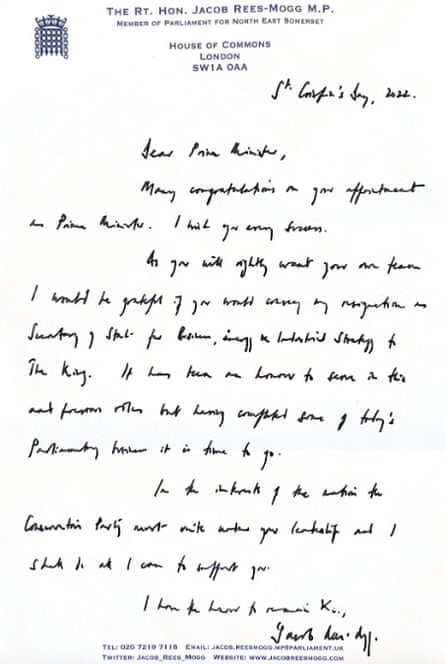Jacob Rees-Mogg has submitted a typically old-fashioned resignation letter, in a last hurrah for the so-called honourable member for the 18th century.
The North East Somerset MP wrote his letter, resigning as business secretary, by hand and declined to share it on social media, in stark contrast with the typed resignation letters shared on Twitter by other MPs.
Rees-Mogg’s handwriting is so difficult to decipher that the Scottish newspaper the National has headlined an article: “We bet you can’t read Jacob Rees-Mogg’s handwritten resignation letter.”

In his characteristically anachronistic style, Rees-Mogg, a devoted Catholic, dated the letter “St Crispin’s Day”.
St Crispin’s Day is a feast day in the Christian calendar on 25 October, which takes its name from the saints Crispin and Crispinian, who were tortured and beheaded by the Roman emperor in AD286.
Many significant battles have taken place on that day throughout history, including the Battle of Agincourt in 1415, immortalised in a St Crispin’s Day speech in Shakespeare’s Henry V.
Rees-Mogg begins his letter by wishing the new prime minister, Rishi Sunak, “every success” in his position.
“As you will rightly want your own team I would be grateful if you would convey my resignation as secretary for business, energy and industrial strategy to the King,” Rees-Mogg added.
In Britain’s parliamentary democracy, the monarch, now King Charles III, retains some prerogative powers, including appointing or dismissing ministers and the prime minister.
after newsletter promotion
Such power is usually exercised only on the advice of ministers, and in reality it is the prime minister who hires and fires their cabinet team.
However, Rees-Mogg is well known for insistently sticking to his interpretation of the finer points of the British constitution.
He famously argued in August 2019 that the decision to advise the Queen to prorogue parliament, weeks before a vote on the final Brexit agreement, was “routine”. The then prime minister Boris Johnson’s advice was later declared unlawful by a unanimous supreme court verdict.









